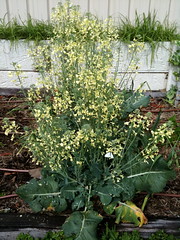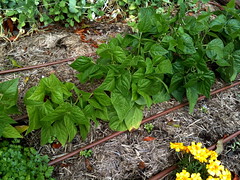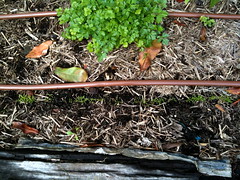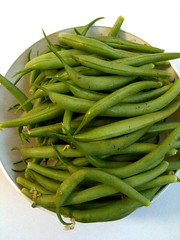Found this great post on Michelle Hamer's blog, From Seed to Table, on growing and propagating capers - great to have some firsthand experience of growing these amazing plants. I've been looking for some good info on propagating capers and this is the best so far.
We had our first caper berry a couple of months ago - a lovely plump specimen! The bush itself is probably some 12 months old and doing okay so far, in a pot. I'd like to try and propagate some more plants from seed, so when it comes to our new landscaping, we can plant out some caper bushes as part of a rockery.
I'd love to know of anyone (especially Perth locals) who has given capers a go, maybe as a rockery plant, with some success!
If you're new to capers like I am, you might find this site useful too.
Happy gardening!
Showing posts with label propagation. Show all posts
Showing posts with label propagation. Show all posts
Sunday, March 9, 2014
Wednesday, October 24, 2012
Propagating plants
I haven't spent much time propagating plants but in the past few weeks have given it a go with some geraniums, pelargoniums and bougainvillea. The geranium is a gorgeous red-pink miniature cluster of flowers. The pelargoniums are both scented, one a cinnamon and the other a rose - I simply love the scented ones as previously posted.

The bougainvillea is a deep pink colour with dark green leaves.

All of these I've struck from cuttings. They look to be taking okay, but no doubt still have a way to go. Hoping they'll survive the summer okay too.
Lastly I've struck some Wormwood cuttings. Wormwood seems to be good for chooks in keeping insects at bay, as it is a natural insecticide.
I want to plant a couple of bushes close to our chook shed and have also spread some branches on the floor of their shed.
The other cuttings, once robust, will go around the kids' playground area and hopefully add to their sensory explorations!
Happy gardening!

The bougainvillea is a deep pink colour with dark green leaves.

All of these I've struck from cuttings. They look to be taking okay, but no doubt still have a way to go. Hoping they'll survive the summer okay too.
Lastly I've struck some Wormwood cuttings. Wormwood seems to be good for chooks in keeping insects at bay, as it is a natural insecticide.
I want to plant a couple of bushes close to our chook shed and have also spread some branches on the floor of their shed.
The other cuttings, once robust, will go around the kids' playground area and hopefully add to their sensory explorations!
Happy gardening!
Monday, October 15, 2012
Rose-scented Geranium (Pelargonium 'Graveolens')
There are so many lovely scented varieties of Geranium, but the Rose-scented Geranium (Pelargonium 'Graveolens') has to be my favourite. I am propagating some to put around the kids' sandpit and play area, along with another variety which is Cinnamon scented - it's amazing!
Apparently, these varieties are not true Geraniums but are Pelargoniums, native to South Africa - what an import, I love 'em!
Apparently, these varieties are not true Geraniums but are Pelargoniums, native to South Africa - what an import, I love 'em!
Tuesday, September 13, 2011
Garden efficiencies and cycles: seed propagation
Having had our no-dig garden now for some five months, we are beginning to get into a bit of a cycle: fennel made way for garlic (planted earlier and now quite large) and new seed plantings of Swiss Rainbow Chard and parsley. The snow peas have virtually finished (with some saved for seeds), just as the dwarf beans began to take off. With the beans in full tilt we planted some purple runner beans from seed (using teepee style sticks over fennel for support and bug protection), and beetroot and carrot seeds, plus some coriander seedlings (sown during Winter).
It's great to see cycles in action side-by-side simultaneously in the one small space - an ongoing cycle of life!
I'm also becoming more aware of the need to be efficient in the garden, not just with precious resources such as water, but with seeds and seedlings, and fertilisers too. I've been researching and reminding myself of ways to store and propagate seed from brocolli, peas and beans, and have struck various herbs like rosemary and marjoram. We've also propogated some green tomato ('Zebra') seeds - hoping they'll germinate!
Being efficient and effective with fertilisers and composting is also important - so far we have one compost bin, but ideally could use two or even three (being about 80 litres in volume), to spread the benefits further and more regularly, and minimise the need for buying compost. Others have been successful at growing compost, mulches, and green manures, as is key to permaculture practices. So our peas and beans can be turned into the ground once harvest is finished, and the fennel leaves bulk out the compost heap too. As the lemongrass kicks in that can provide some mulch/compost.
I'm beginning to see the real benefits of the no-dig approach as well - the soil is really friable and free-draining and the plants seem to grow more vigorously. It's easy to beef up a zone after one crop in preparation for another as well - although due to our small-sized garden this seems more intensive to do!
And finally, our new limestone raised garden bed now has some tomatoes planted - the big Aussie Grosse Lisse, Roma, and Beefsteak varieties! Bring on Summer (and Spring has just begun)!
Happy gardening!
It's great to see cycles in action side-by-side simultaneously in the one small space - an ongoing cycle of life!
 |
| Past... |
 |
| Present... |
 |
| Future...! |
Being efficient and effective with fertilisers and composting is also important - so far we have one compost bin, but ideally could use two or even three (being about 80 litres in volume), to spread the benefits further and more regularly, and minimise the need for buying compost. Others have been successful at growing compost, mulches, and green manures, as is key to permaculture practices. So our peas and beans can be turned into the ground once harvest is finished, and the fennel leaves bulk out the compost heap too. As the lemongrass kicks in that can provide some mulch/compost.
I'm beginning to see the real benefits of the no-dig approach as well - the soil is really friable and free-draining and the plants seem to grow more vigorously. It's easy to beef up a zone after one crop in preparation for another as well - although due to our small-sized garden this seems more intensive to do!
And finally, our new limestone raised garden bed now has some tomatoes planted - the big Aussie Grosse Lisse, Roma, and Beefsteak varieties! Bring on Summer (and Spring has just begun)!
Happy gardening!
Labels:
no-dig,
propagation,
seeds,
spring,
sustainability,
tomatoes,
vegetables
Subscribe to:
Posts (Atom)

